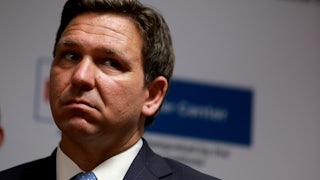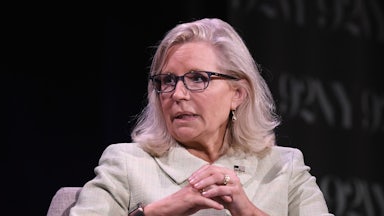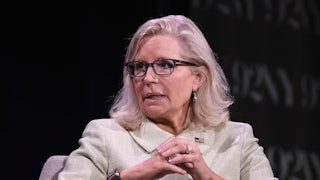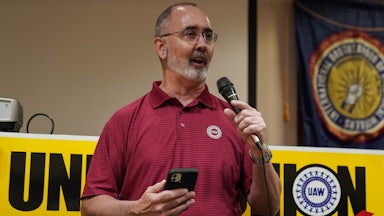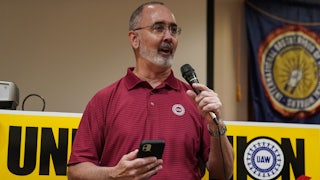On Wednesday, Florida Governor Ron DeSantis will announce that he is running for president. It will undoubtedly come at one of the lowest points he could have possibly chosen since his name began being bandied about as the future of the Republican Party during the Covid summer of 2020. For two years, DeSantis was feted by mainstream, conservative, and right-wing outlets as not only Trump’s natural successor but as a one-size-fits-all Republican for the post-Trump era. In their telling, there was something for everyone: He liked picking meaningless culture-war fights, which would please the GOP base; he also seemed smart and, crucially, was not prone to posting insane things on social media in the middle of the night. He was “Trump with a brain”: a smarter, stabler Republican who could reunite a fractured party.
Over the last few months, this carefully crafted persona has fallen apart. Upon closer inspection, DeSantis is … well, weird. He’s a real odd duck, wooden and impersonal. Uneasy in crowds, he oscillates between scowls and howling laughter. His political instincts, once vaunted by the press, have also come into question. He is losing his war with Disney, a publicity stunt that is now costing his state hundreds of millions of dollars. And then there’s Donald Trump. Ever since Trump was arrested in Manhattan in April on charges involving hush-money payments sent during the 2016 election, the former president’s poll numbers have skyrocketed and DeSantis’s have plummeted. A lot of Republican voters, it turns out, aren’t really interested in a Trump alternative right now.
Still, diminished as he may be, DeSantis will enter the Republican primary on Wednesday in a launch aimed at placating the most terminally online among us: an event on Twitter Spaces with Elon Musk. “I will be interviewing Ron DeSantis, and he has quite an announcement to make. And it will be the first time that something like this is happening on social media and with real-time questions and answers, unscripted,” the Twitter CEO said, in between sending emoji replies to his small army of incel fans. There has been some speculation that DeSantis might be better served sitting out this primary—that he is already too wounded to win the nomination, that it’s best for his long-term future to keep his powder dry. But DeSantis doesn’t really have a choice now. He has been touted as a nominee for too long; sitting out would risk making him look like a loser. In four years, who knows if he’ll have the mojo to mount a White House run—or whether the GOP base will have moved on. (In any case, even if DeSantis were to sit out 2024, it’s not clear that he wouldn’t once again have to face Donald Trump four years later.)
Although Trump currently boasts a huge, seemingly insurmountable lead—per FiveThirtyEight’s poll of polls, he leads the Florida governor by more than 30 points—the Republican nomination is hardly a sure thing for the former president. He remains popular with the GOP base but deeply unpopular with the general electorate. Added to the usual valise of scandals that he carries everywhere he goes is a growing array of criminal charges.
Much of the electorate has not had a close look at him since he left office—after, it should be said, trying to orchestrate a coup—and the changes he has undergone are hardly flattering. He is older, flabbier, and even more solipsistic and deranged. His campaign is built around few issues that matter to real people. Instead, it’s mostly a platform for Trump to air a wide array of personal grievances, real and imagined. He’s a bit like late-stage Lenny Bruce, drily reading legal filings aloud in a comedy club, only substantially less funny.
Trump sees DeSantis as his primary rival for the nomination, a fact borne out by much polling. But Trump may not actually be DeSantis’s biggest worry. For many months, many potential Republican candidates hesitated to enter the arena, thanks in part because of the assumption that the Florida governor would be the presumed choice for those looking for a Trump alternative and that he would hoover up the necessary endorsements and donor checks. On Tuesday, The New York Times’ Astead Herndon wrote a typically perceptive newsletter about the headwinds a DeSantis 2024 campaign is already facing. And aside from the expected buzzsaw that is Donald Trump, a growing host of Trump alternatives, newly emboldened by DeSantis’s own vulnerabilities, are jumping in the race and gumming up the works:
DeSantis no longer scares away candidates who were once deferential to his status as the front-runner in the Trump-alternative sweepstakes. Last week, several Republican governors made notable moves: Doug Burgum of North Dakota—a former Microsoft executive—made overtures toward joining the 2024 field, and Glenn Youngkin of Virginia released an advertisement linking himself to Ronald Reagan. Gov. Chris Sununu of New Hampshire also said he was thinking about joining the race, days after a report that former Gov. Chris Christie of New Jersey might join as well.
At this stage in the primary—we are still more than six months away from any elections—these candidates will not be trying to take on Donald Trump. Instead, they will try to build a coalition that might enable one lucky candidate to defeat him down the line. The best way to do that is not by immediately going after the primary’s de facto final boss. Rather, it’s by going after Ron DeSantis, who currently has the largest following outside of the former president’s. The growing Republican field is on the verge of making the same mistake that GOP politicians made in 2016—a large pool of candidates almost certainly benefits Trump, who has a significantly higher floor than his rivals. The incentives, moreover, are more or less the same as they were then: It is more sensible for candidates to take out DeSantis as a stepping stone to defeating Trump. That means once again, the former president’s rivals will be sparring among themselves instead of quickly coalescing around a champion.
DeSantis’s best shot at winning the nomination was in a head-to-head contest with Trump (or in a near head-to-head one with former Vice President Mike Pence, who no one likes). He’s not getting that matchup. Instead, he’s likely to end up with what can fairly be called his worst-case scenario: being the focus of everyone else’s attacks. When the debates begin this summer, the front-runner won’t be the one wearing the biggest target on his back—DeSantis will.


